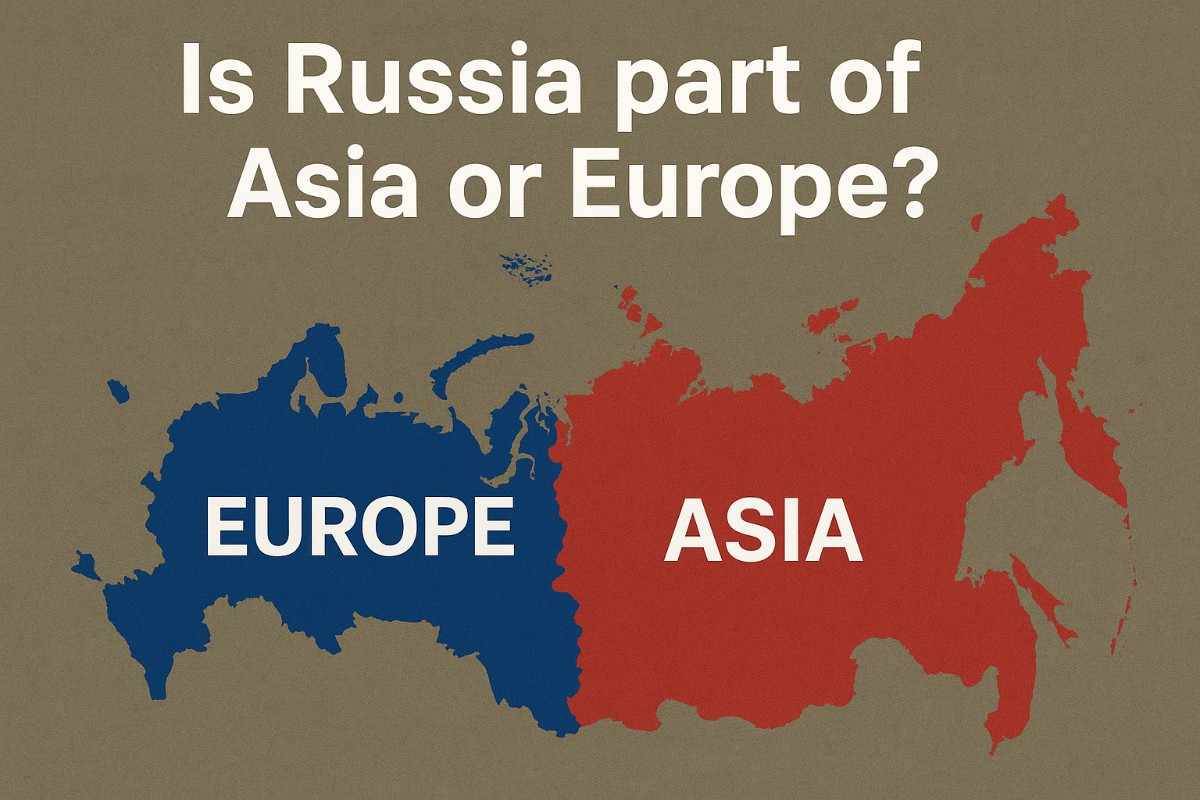share
CAROUSEL
Is Russia part of Asia or Europe?
Sept. 7, 2025
634 Views
Is Russia in Asia or Europe? Geography, History & Culture Explained
Russia is the largest country in the world, covering more than 17 million square kilometers. But one question has puzzled people for centuries: Is Russia part of Asia or Europe? The answer is not as simple as choosing one continent. Russia is a transcontinental country, meaning it lies across both Europe and Asia.
In this guide, we’ll explore Russia’s geography, history, culture, and identity to answer: Is Russia in Asia or Europe?
Russia spans two continents. About 77% of Russia’s land area lies in Asia, while 23% lies in Europe. However, despite most of its land being in Asia, nearly 75% of the Russian population lives in the European part.
The Ural Mountains serve as the traditional boundary between Europe and Asia. Cities such as Moscow, Saint Petersburg, and Kazan are in Europe, while Siberia and the Russian Far East are in Asia.
Why Is Russia a Transcontinental Country?
Russia’s vast territory stretches across 16 time zones, making it one of the few countries that cannot be classified into a single continent. The Ural Mountains, Caspian Sea, and Black Sea are used as natural dividing lines.
This unique geography makes Russia both a European and Asian nation, influencing its politics, economy, and culture.
What Percentage of Russia Is in Europe and Asia?
-
Asia: ~77% of land area (Siberia, Russian Far East, Ural regions)
-
Europe: ~23% of land area (Western Russia, Moscow, Saint Petersburg)
-
Population: About 75% live in European Russia, 25% in Asian Russia
This shows that while Russia is geographically more Asian, it is culturally and politically more European.
Which Part of Russia Is European?
European Russia lies west of the Ural Mountains and includes major cities such as:
-
Moscow (capital)
-
Saint Petersburg
-
Kazan
-
Nizhny Novgorod
This region is the heartland of Russian politics, culture, and history. It has strong ties with European countries like Finland, Norway, Poland, Ukraine, and Belarus.
Which Part of Russia Is Asian?
Asian Russia lies east of the Ural Mountains and covers vast regions like Siberia and the Russian Far East. It borders China, Mongolia, Kazakhstan, and North Korea.
Key features of Asian Russia:
-
Harsh winters and vast forests
-
Rich in natural resources (oil, gas, coal, timber)
-
Sparsely populated but home to diverse ethnic groups such as Tatars, Yakuts, Buryats, and Mongols
Is Russia Culturally European or Asian?
Russia’s identity is a blend of both continents:
-
European Influence: Literature (Tolstoy, Dostoevsky), music (Tchaikovsky), art, and Orthodox Christianity.
-
Asian Influence: Architecture, cuisine, traditions, and cultural diversity from Turkic, Mongol, and Central Asian communities.
Because of this unique mix, Russia is often called a Eurasian country.
Russia’s Role in History and Politics
-
European Side: The Russian Empire and later the Soviet Union played dominant roles in shaping European politics.
-
Asian Side: Russia expanded into Siberia and Central Asia, connecting Eurasia through trade and colonization.
-
Global Role: Today, Russia bridges Europe and Asia in terms of politics, economy, and diplomacy.
Is Russia in Europe or Asia? (Final Answer)
Russia is a transcontinental country. Geographically, most of its land is in Asia, but most of its people, culture, and politics are centered in Europe.
So, when someone asks:
-
Is Russia in Asia? → Yes, 77% of its land is.
-
Is Russia in Europe? → Yes, 23% of its land is, and 75% of its people live there.
-
Is Russia both? → Absolutely. It is one of the world’s most important Eurasian nations.
FAQs About Russia’s Location
Q1: Is Moscow in Europe or Asia?
Moscow, the capital of Russia, is located in Europe.
Q2: Is Siberia in Europe or Asia?
Siberia is located in Asia, covering a large part of northern Russia.
Q3: Which continent is Russia officially in?
Russia is officially a transcontinental country spread across both Europe and Asia.
Q4: Why is Russia considered European?
Because its major cities, politics, and cultural life are concentrated in the European part.
Q5: Is Russia more Asian or European?
Geographically more Asian, but culturally and historically more European.
Final Words
Russia is a unique transcontinental nation that cannot be classified as purely Asian or European. With land in Asia and people and culture in Europe, Russia is best described as a Eurasian country. Its location at the crossroads of two continents has given it a rich history, diverse culture, and global influence.
share Share now









